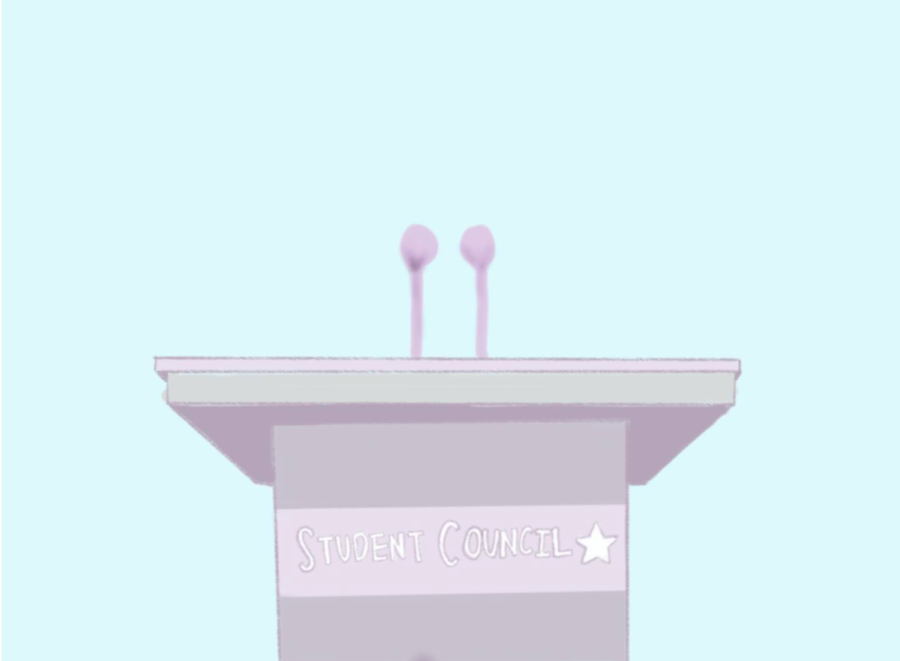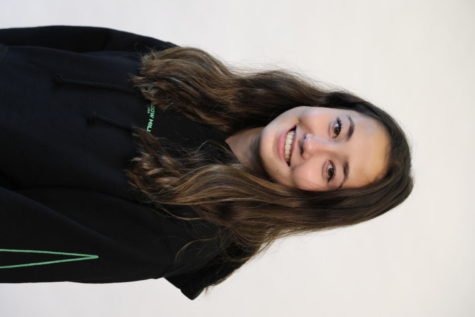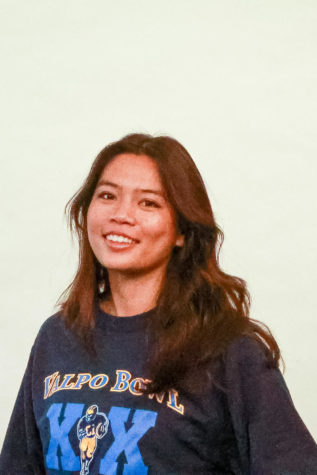Members of Menlo Student Council Reflect on Program Changes
In the 2021-22 school year, the student council program has expanded its size in an attempt to include more voices and spark change faster. Staff illustration: Dorinda Xiao.
February 27, 2022
In the 2021-22 school year, many changes were made to the format of Menlo’s student council program, such as the creation of new committees and weekly student forums. Altogether, the student council program has expanded this year to represent more voices and ensure that each involved student can dedicate their time to matters that directly interest them.
In previous years, the student council has typically divided itself into committees, with differing targets and tasks. According to senior Sammie Dostart-Meers, who is currently student body president, the student council increased its number of committees this year, which also increased the number of students involved.
Two of the new committees include the communications and academic committees. According to Dostart-Meers, communication is a key part of the student council this year, which had been lacking in previous years. “Last year, no one knew what the student council was doing, so we thought we would change that by having [a group] directly on communication,” Dostart-Meers said. The communications committee focuses on matters such as the weekly Student Announcements.
Similarly, according to junior Class President Jack Goler, the academic committee was started this year to help students readjust to in-person learning — specifically for sophomores and freshmen who have not fully experienced high school prior to the pandemic. “Recently, some issues we have worked on in the academic committee include creating a shared calendar of assessments so teachers don’t overload students with all of their tests in a single week, as well as making peer tutoring opportunities more widely available,” Goler said. The shared calendar is different from the blackout calendar because it focuses on the entire school year rather than busy weeks such as finals week. Additionally, the shared calendar isn’t as strict as blackout days, and only warns teachers about stressful schedules. The calendar is currently still in a trialing process.
In addition to new committees, new positions were also added this year, according to Goler, further increasing the size of the student council.
As a freshman, Class President Avani Ganesan has not seen how the student council functioned in previous years. Despite this, Ganesan said that the current structure of the student council is well-designed to benefit the community.
Junior Sofia Labatt is also new to the student council this year. Labatt is a member of the athletics committee, where meetings are spent organizing events such as the boys volleyball game, deciding athletes of the month and discussing other sports-related matters. According to Labatt, the division of student council committees gives her a voice on a topic she’s specifically interested in: sports. According to Ganesan, the overall program is welcoming to everyone, since students are able to choose what issues they each want to tackle. Because the student council also contains a larger number of representatives this year, Ganesan feels that the program can more accurately reflect each grade’s needs.
Contrary to Ganesan, an anonymous student council leader says that the overall program feels very senior-heavy this year. “The amount of power each person has is based on what position you have,” the anonymous student said. “Even though lots of students are in the student council, it doesn’t feel like everyone has equal opportunities to speak their mind.” While the anonymous member agreed that the seniors are friendly and spread positive ideas, they believe it would also be nice for the grades to be more equally represented.
An anonymous elected senator in the council agreed with this statement, adding that it feels strange to offer ideas that might oppose what the seniors want. “For example, if someone wants to speak up and they’re not necessarily having the same experience as a senior, it’s weird to say something contrary because [the seniors] normally all agree,” the senator said.
“On Mondays, President[’s] Council meets to set agendas for Wednesday [meetings] and discuss grade specific feedback,” Ganesan said. “Wednesdays are committee meetings for student council, and then there is one more day during the week where grade senators and freshmen meet.” According to Ganesan, each grade has its own meetings each week, since goals in each grade vary slightly.
The anonymous senator agrees with Ganesan that committees have allowed the student council to focus on more grade-based goals this year, but thinks that it has also caused the program to act less effectively. “Committees have been helpful in terms of communicating with more of the students, but it’s made us less productive, and I don’t think [committee] meetings are always the best use of time,” the senator said. According to the senator, even though there are many benefits to having so many committees, they could meet less often, leaving Wednesdays to be spent with the entire student council as one group. “Meeting with committees outside of our regular time would make it so that there’s more time to talk as a group about real issues in our school,” the senator said.
A second anonymous senator agreed, claiming that the student council can feel too large at times, causing disorganization and unproductivity. Even though special committees help assign focus to certain topics, there is still difficulty with making progress. “It’s hard to get stuff done in every single committee because we’re just spread out so thin,” the second senator said. “I think it’s nice that a bunch of students are taking on leadership positions in the school, but I don’t think that all these leadership positions are necessary sometimes.” Despite this problem, the senator hopes to remain a part of the student council in the future, and therefore preferred an anonymous identity. “Being part of the student council, I like helping people make change, even if it doesn’t always feel like [this is happening],” the senator said.
Throughout the first semester this year, Goler has worked on gaining more control for juniors over how their time is spent at school. “I’m doing this in a couple of ways. The first is to give juniors time back by reducing the amount of time they would have otherwise spent in class meetings, and the second is to try to make the workload for juniors more manageable,” Goler said. “Junior year is a notoriously busy and stressful year for students, which is why freeing up time in their lives is so important.” According to Goler, in the first semester, the student council has dismissed a few class meetings early to give juniors back their time.
Altogether, the student council is aiming to fix any damage that the COVID-19 pandemic caused towards the Menlo community, according to Dostart-Meers. “These goals include bringing back the social light at Menlo, easing the academic transition to in-person for all students and addressing any cultural issues that were put on the backburner during COVID-19,” Dostart-Meers said.




